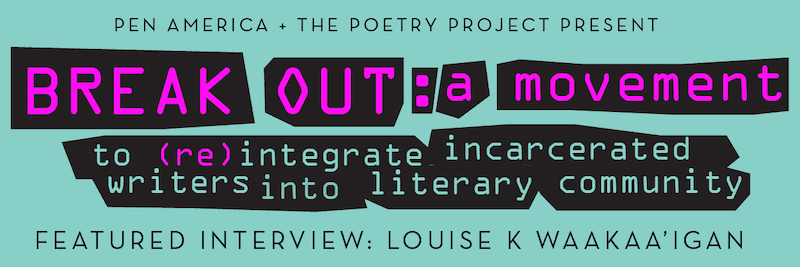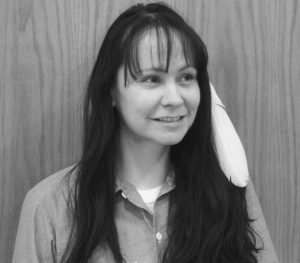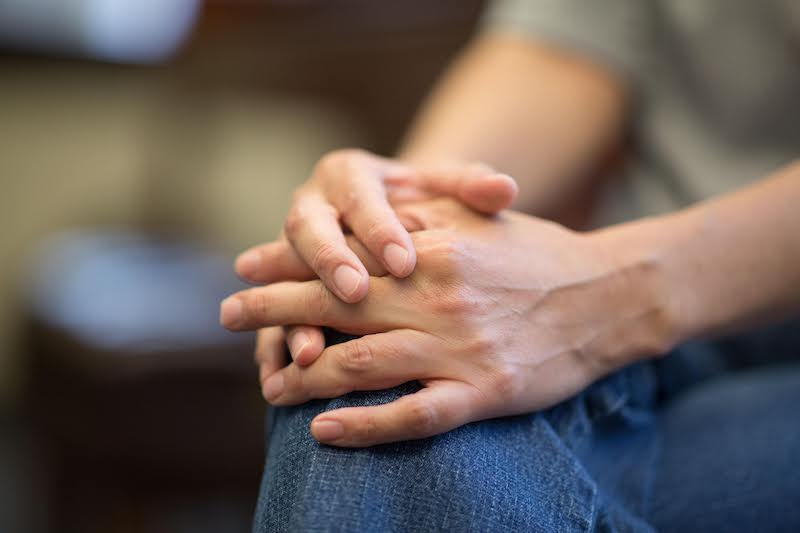Works of Justice: An Interview with Poet Louise K Waakaa’igan
Works of Justice is an online series that features content connected to the PEN America Prison and Justice Writing Program, reflecting on the relationship between writing and incarceration, and presenting challenging conversations about criminal justice in the United States.

This September, in commemoration of the Attica Riots, PEN America and The Poetry Project launch BREAK OUT: a movement to (re)integrate incarcerated writers into literary community. Throughout the month, over two dozen local reading series in New York City—and across the country—will feature the work of a currently incarcerated writer. One of our featured writers is Louise K Waakaa’igan. Learn more about the effort here.
I burn with anger.
I yearn to fight
to bleed, create new brave scars
standing in snow tracks in these concrete plains —
I am desert sand, proud with no water.
A pipe carrier
with no elder — David has passed.
I am without.
From “Facility Bred” by Louise K Waakaa’igan
I first read Louise K Waakaa’igan’s poetry (formerly known as Karol House) as a PEN America Prison and Justice Writing Program intern, when I had the opportunity to curate work for PEN America and The Poetry Project’s BREAK OUT reading series. Having grown accustomed to the male-dominated community of writers who submit work to the Prison and Justice Writing Program, I was immediately drawn to Louise’s vulnerable and frank discussions of the intersections between gender, indigeneity, and tradition. Her written voice exudes nostalgia and a profound sense of longing. In the spirit of the BREAK OUT series, which seeks to (re)integrate incarcerated writers into literary community, I interviewed Louise on the relationship between poetry and history, writing as a source of healing, and her experience of writing while incarcerated.
 Louise K Waakaa’igan (formerly Karol House) is enrolled at Odaawaa Zaaga ‘iganiing (Lac Courte Orielles Reservation) in northern Wisconsin. Louise is the recipient of the 2017 PEN America Prison Writing Awards Poetry Prize for her first place poem, “This Is Where,” and the first place winner of Minnesota Prison Writing Workshop’s Broadside Competition in 2016 with her poem “Within.” Most recently, Louise won the Willow Books Chapbook Award: A Report from the Inside (2018) with her manuscript This Is Where. Louise’s work has been previously published in PEN America’s 21 Mythologies, The Moon Magazine, Doors Adjacent, 27th letter, Words in Gray Scale, and The Asian American Writers’ Workshop: A World Without Cages. She will be released in 2019 from the Shakopee Correctional Institution in Minnesota.
Louise K Waakaa’igan (formerly Karol House) is enrolled at Odaawaa Zaaga ‘iganiing (Lac Courte Orielles Reservation) in northern Wisconsin. Louise is the recipient of the 2017 PEN America Prison Writing Awards Poetry Prize for her first place poem, “This Is Where,” and the first place winner of Minnesota Prison Writing Workshop’s Broadside Competition in 2016 with her poem “Within.” Most recently, Louise won the Willow Books Chapbook Award: A Report from the Inside (2018) with her manuscript This Is Where. Louise’s work has been previously published in PEN America’s 21 Mythologies, The Moon Magazine, Doors Adjacent, 27th letter, Words in Gray Scale, and The Asian American Writers’ Workshop: A World Without Cages. She will be released in 2019 from the Shakopee Correctional Institution in Minnesota.
Louise has been writing since adolescence and is “striving to make sense of the arrangement of words given from the cosmos.”
ELEANOR MAMMEN: You incorporate many aspects of your identity in your work, honoring the communities and experiences you come from. Among others, you discuss being Native American, growing up on a reservation in a single-parent household, and experiencing sexual harassment. How have the communities you identify with impacted your writing? Has writing allowed you to rethink your various identities, or understand formative experiences in new ways?
LOUISE K WAAKAA’IGAN: The discipline of writing, for me, is multifold. While the act of writing itself did help me process these experiences, I needed to thoroughly examine the cumulative effect of these experiences, and the only way I could was to rediscover who I really was. That took a lot of time and rewriting. Time, I had. It was the writing down of the words that I needed to sit with. What I learned, in part, was the writing offered me a safe and therapeutic way to return to those moments.
MAMMEN: In both your poems, “Within” and “This is Where,” you explore the motif of home, particularly feeling separated from your home due to your incarceration. How do you define home? Is it a physical location, a group of people, a feeling, or something else? How do you use writing to access “home” while incarcerated?
WAAKAA’IGAN: Home is my family. Home was something I didn’t understand for so long, even after my entrance into incarceration. Home became something more than any physical structure I resided in. Both poems mentioned speak into this clearly. When I write, I am with my home, with my family, with my Indigenous Peoples. I am not just an offender, I am a woman, a daughter, a mom, sister. It is through and with my writing that I get to be who I am, a multifaceted Anishinaabekwe with a voice and a story to share.
MAMMEN: Your poem “No, I Am Not” explores themes of history and lineage, as you recall family lines, your ancestors, and some of your earliest memories. How does historical and ancestral knowledge inform your poetry?
WAAKAA’IGAN: As an Indigenous woman, it is imperative that I learn not only about the history of my family, but the history of Indigenous Peoples, their nations, their stories, their languages, this collective understanding of historical trauma. This is not an easy task, which is now being stunted because of my incarceration. There is this veil, this colonial, westernized veil that has blinded Indigenous Peoples for over a century. One can see the effects of this present today, in the media where Indian Peoples are portrayed as mascots, maidens, even stoic warriors accompanied with their headdresses and feathers. Yet, we as Indian people are so much more than that. We are writers, artists, parents, students, athletes, business owners, homeowners, neighbors. The list goes on and on. As I learn more I am able to connect more, connect to my history, connect to my past and my today. And with connection comes responsibility. I must share all that I gain with the women around me, the next ones. Together, this is how we heal.

Photo by Emily Baxter
MAMMEN: In “Facility Bred,” you write, “I burn with anger. / I yearn to fight / to bleed, create new brave scars / standing in snow tracks in these concrete plains.” Do you consider writing an act of anger? How do you use writing to fight against the constraints you experience?
WAAKAA’IGAN: I don’t believe writing is a form of anger, not for me. Yet writing affords me a venue to express my thoughts, fears, or whatever it is that I feel, things I need to release from my center. Writing is the only way I can “fight against the constraints” especially in regards to my incarceration. But in all reality, the “fight” lies in me sharing my voice, my story, my truth with no shame or fear of what others may think. As open as our world is today on a multitude of issues, we still have such a long way to go.
MAMMEN: I was particularly drawn to the exploration of guilt in your work; you discuss feeling “dirty,” “shame ridden,” “empty.” Does writing poetry serve a cathartic role for you? Do you believe writing can be a tool for healing, and, if so, how?
WAAKAA’IGAN: Poetry, in itself, has evolved tremendously over time for me, and not just in terms of my own writing. I am now able to sit with another’s poetry, with no expectation or demand of my ego. I couldn’t do that with other women years ago. Today, and within the past few years, poetry has definitely become an integral tool for me to access growth, healing, acceptance, and understanding—for the journeys around me, and the journey I, myself, am on. But it is not something I can pre-mold or plan in any way. I have my inspirations, yes, but I also have this yearning deep within that I must surrender in order to get myself out of the way, so the poetry can travel.
Louise’s work will be staged live on September 15, 2019, in Brooklyn, New York, at the Women Writers in Bloom Poetry Salon. Learn more about the BREAK OUT movement »






